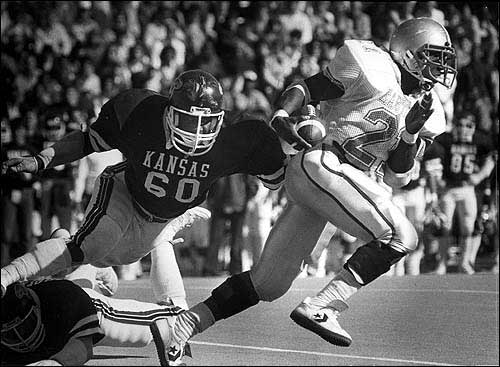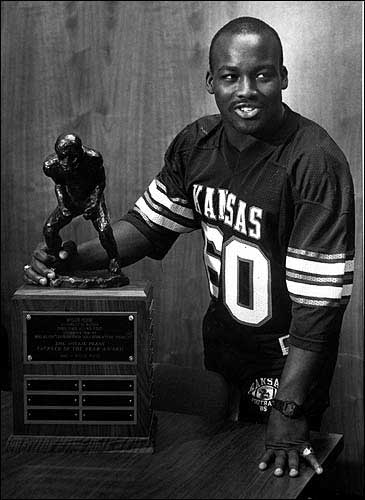Pless confident in KU choice
Canadian Hall of Famer happy he was a Jayhawk
You can count on the fingers of one hand the number of football players Kansas University has recruited over the years out of Alabama.
Thus, it was a rare moment in 1982 when a 5-foot-11, 210-pound linebacker from Anniston, Ala., signed a letter of intent with KU.
Willie Pless never has regretted the decision.
“Absolutely not,” Pless said a few days after being named to the Canadian Pro Football Hall of Fame. “If I had to do it all over again, I’d make the same decision. Kansas was the place for me.”
Pless went on to become arguably the best defensive player in KU football history and certainly the best defensive player in Canadian Football League history.
Now, at the age of 42, Pless has settled in Edmonton, Alberta, where he spent eight of his 14 CFL seasons. He and his wife, Rhonda, also a KU grad, are raising three daughters while he operates a personal training business.
A few years ago, Pless returned to Lawrence to talk to KU football coach Terry Allen about the possibility of joining his staff in some capacity. Nothing came of those talks, though, and Pless says he no longer is interested in joining the coaching profession.
However, that doesn’t mean he wouldn’t love to return to Lawrence.
“If I wasn’t here,” he said by phone, “I’d definitely be there.”
Living in Lawrence also would bring him closer to Dr. Robert Fretz, his godfather and mentor. Dr. Fretz, who lives in St. Joseph, Mo., had his shingle hanging in Anniston when Pless was a high school football player.

Former Kansas University linebacker Willie Pless (60) is the all-time KU leader in tackles. Pless, who starred for 14 seasons in the Canadian Football League, recently was elected to the Canadian Pro Football Hall of Fame.
A native of Dodge City and a KU graduate, Dr. Fretz remembers Pless’ surprise when he learned the Anniston High coach had mailed films of him playing football to the KU football office.
“The first Willie learned about it was after he had been offered a scholarship,” Dr. Fretz said.
Later, Dr. Fretz sent more film to KU linebackers coach Mike Sweatman.
“Mike called me immediately after he had watched the films,” Dr. Fretz said. “When he called, he asked me not to show the films to anyone else and that Kansas was offering Willie a full ride.”
Both Alabama and Auburn had told the Anniston High coach they didn’t consider Pless big enough to play NCAA Division I-A football.
In that regard, Dr. Fretz likes to tell the story about legendary Alabama coach’s Bear Bryant’s reaction to Pless’s performance in the state’s high school all-star football game. Pless helped hold Auburn-bound and future Heisman Trophy winner Bo Jackson to 16 yards rushing in the first half, and he recovered two Jackson fumbles.
A day later, according to Dr. Fretz, Bryant called to ask why Pless was going to Kansas.

Willie Pless holds the award that bears his name: Kansas University's Willie Pless Tackler of the Year Award.
“When I told him that his recruiting coordinator thought Willie was too short,” Dr. Fretz related, “he replied, ‘I think he grew about six inches last night.'”
A few other schools also were interested in Pless, but their recruiters told him he probably would be moved to the secondary because of his size.
“Kansas wanted me to play linebacker,” Pless said, “and in my mind that’s what I wanted to play.”
After spending most of his freshman year as a special-teams player, Pless became a starter at linebacker in the second game of the 1983 season and went on to average 195 tackles per year.
Ignored in the 1986 NFL draft because of his small stature, Pless went to Canada and played three years for the Toronto Argonauts before giving the NFL a shot. But he hurt his back in the New Orleans Saints’ preseason camp and never did don an NFL uniform.
Instead, Pless went back to Canada and tackled his way into history.
From the Deep South to the Central Plains and then on to four different cities in Canada, Pless says he feels blessed to have experienced so much geographic and cultural diversity in his four-plus decades.
“It’s been a great journey,” he said. “That’s for sure.”


